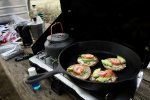NCLRbear
Adventurer
I’ve been reading some threads on here about what the best stove is. I’ve seen a lot of people mention Partner or Camp Chef Everest and even jetboil. But what makes a good stove?
Is it all about btu’s? In that case the Camp Chef should take the cake at 20,000 btu (Hr)per burner. Even my cheap Coleman Triton puts out 11,000 btu per burner both beating the Partner at 10,000.
Or is about the diameter of the burner? My range at home has different size burners and the bigger ones get hotter faster and boil water real quick.
Living in California I cook on the beach and my next trip I’m cooking at 7,000 ft at 2200 hours. So I just need a propane stove. I also hardly ever snow camp but it does get cold in the morning in Death Valley too.
So what makes a good stove? I don’t want to drop four bills on a stove that will last forever but cook the same or worse than my cheap Coleman but I’ll happily spend that hard earned money on something that cooks like my range at home.
I’m also looking for a 22” so it can fit in my alu-box.Picture below shows me cooking on a guided trip during a sandstorm in DV.


Is it all about btu’s? In that case the Camp Chef should take the cake at 20,000 btu (Hr)per burner. Even my cheap Coleman Triton puts out 11,000 btu per burner both beating the Partner at 10,000.
Or is about the diameter of the burner? My range at home has different size burners and the bigger ones get hotter faster and boil water real quick.
Living in California I cook on the beach and my next trip I’m cooking at 7,000 ft at 2200 hours. So I just need a propane stove. I also hardly ever snow camp but it does get cold in the morning in Death Valley too.
So what makes a good stove? I don’t want to drop four bills on a stove that will last forever but cook the same or worse than my cheap Coleman but I’ll happily spend that hard earned money on something that cooks like my range at home.
I’m also looking for a 22” so it can fit in my alu-box.Picture below shows me cooking on a guided trip during a sandstorm in DV.







